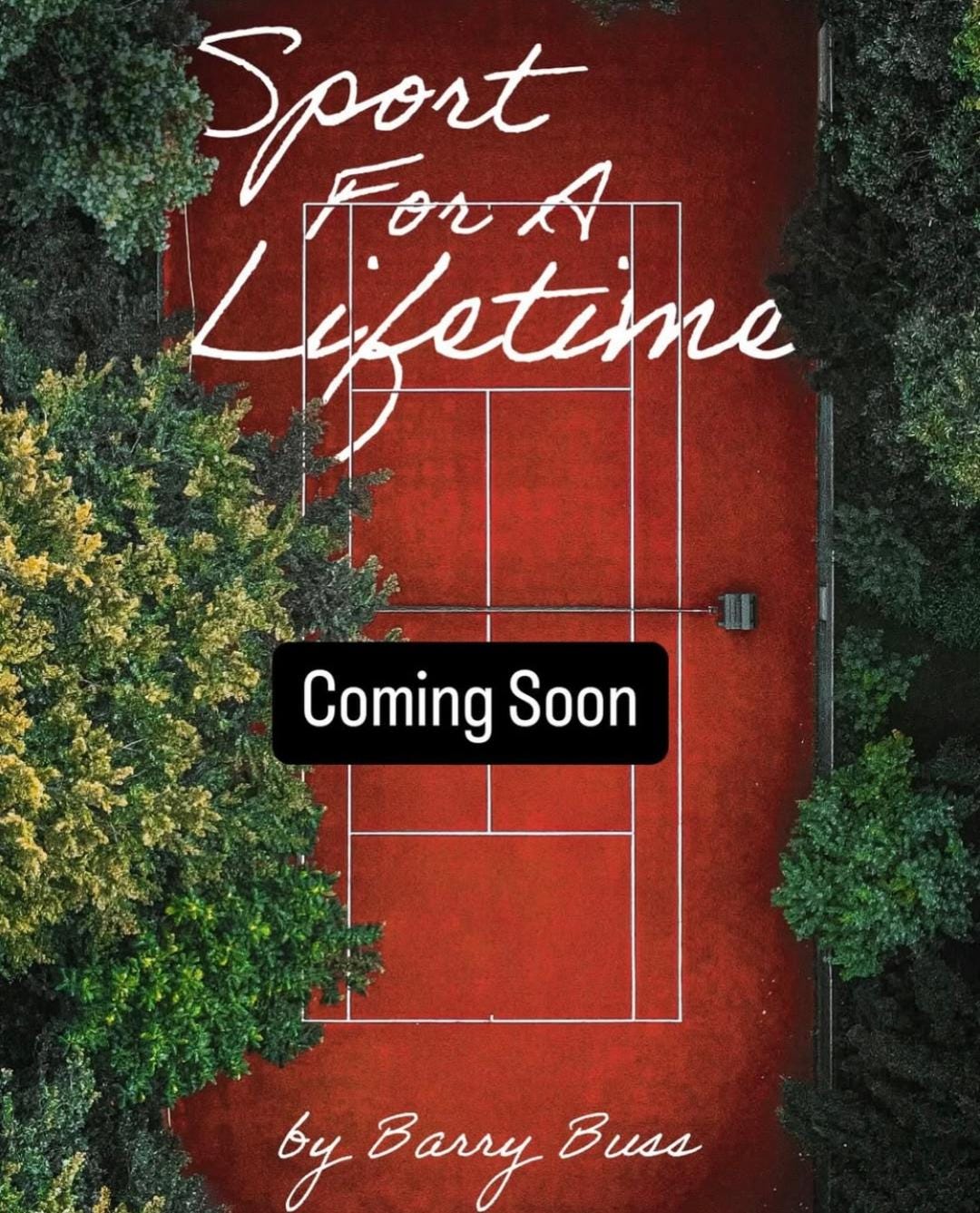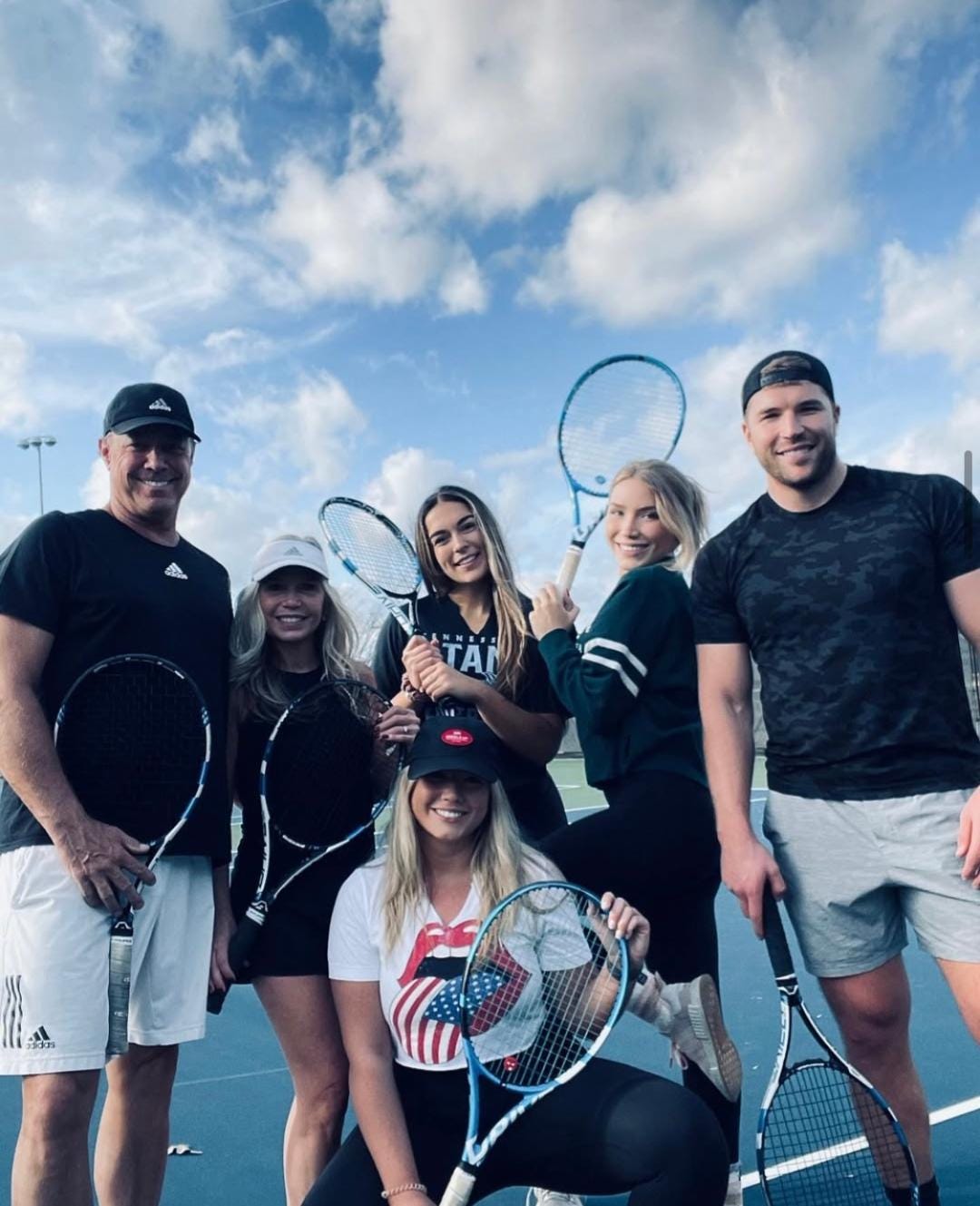Sport For A Lifetime
I’ve always loved a good sports moniker. Football is played with a pigskin on a gridiron; basketballers play their hoops. Boxing, for all its brutality, is deemed the sweet science, with Baseball America's pastime. Not all nicknames are created equal, though. The oddly named Pickleball somehow feels Dink helps its brand. We here think not. But if prizes were given for best nicknames, compared to tennis, all other sports are playing for second, for no nickname can hold a candle to Tennis' Sport For A Lifetime.
A lifetime. That's a pretty bold claim. But upon review, I think it holds up.
I think back to my first ever time seeing tennis played. Sneaking off to find my Dad playing this mysterious game at our summer swim club, I would walk past picturesque terraced courts, groups of adults dressed stylishly in the classic whites of the time, swinging elegant pieces of wood at a fuzzy yellow ball, back and forth, back and forth, the sounds, the rhythms, the focus, the movement, the pageantry of it all. I was captivated by tennis' cadence before I'd ever hit a ball.
I soon started pestering my Dad to let me try this tennis until he finally acquiesced. And that first time led to a second time; add it all up, it's now a lifetime… And I still love it; can't wait to get back out there for my next time.
And play we do. On Tennis' vast Superhighway, there's a lane for everyone. If collecting scalps is your nature, there's competition for you. Juniors, Seniors, Pros and Ams. If you prefer your tennis more recreational, there are clinics, groups, weekly hits, and family outings.
Yet the tennis life can be cruel. Those of us who start young peak quite early, our white star energy burning brightest as we chase fame and fortune. The blinding quality of ambition, burning too hot to see or feel the wisdom our great bestows. Those revelations come much later in our playing lives, often during moments of reflection and regret. As with any endeavor, it’s hard to see what you're getting out of it when consumed by it, the monomaniacal pursuit of greatness. But our waves eventually crest, with our best playing days behind us, to never be approached again. In this descent back to normality, our fiery nucleolus cools, creating a more stable core where tennis’ lessons can attach, take hold, and blossom, deepening our appreciation of our great sport.
And if you come to tennis later in life, we welcome you with two hands, and we wish that you, too, had been so fortunate to learn our game early like many of us. And though greatness is likely out of reach, everyone can get better and, in the process, discover all the life lessons tennis teaches those who engage with this most confounding of sports. Ultimately, no matter your athletic DNA, we all end up at the same place. Our athleticism greatly diminished; in star parlance, we all fade toward red giants, burning up our last reserves of energy, not exactly lighting up the court or the night sky. We've ceased improving; we must work hard to stay the same. But we continue to play, stubbornly trudging forward, our vague mission unaccomplished. At some fundamental level, it begs the question of why.
There's a Newtonian aspect to the tennis life. There's no off-season in tennis; it's just next season with scarce time for pause and reflection. The term is inertia. A body in motion will remain in motion until acted upon by an outside force, and those forces do come: family, career, injuries, and health. Orthopedists love us; dermatologists, not so much. Life interfering with leisure. But we're tennis players. We can’t stop, won’t stop.
You gotta fight for your right to rally.
And for each action, there is an equal and opposite reaction. Faced with adversity, we push back. Pain, frustration, regression, and ennui will not deter us. We bargain with ourselves, compromising, minimizing, rationalizing; our mental gymnastics Simone Biles-esque. We refuse to take the clearly marked exits; we keep on trucking past the needed rest areas, concocting our circuitous paths forward, riddled with detours. We're going to reach our final destination one way or another. We have to; how else will we make it a lifetime?
But what keeps driving us forward? Our connection to the sport morphs, becoming more than the forehands and backhands we obsess about. It starts with us being fans and having role models. We're attracted to their playing styles, but it's deeper than that. They embody the values we hold dear. The class and grace of Federer, the pugnacious rebel in a Kyrgios, the us against the world presence of the sisters Williams. We'll never play like them, but we can conduct ourselves like them. For their greatness transcends their play. The requirements of elite competition demand it. Sportsmanship, class, grit, resilience, patience, gratitude, belief, work ethic and many more; all the attributes of society’s most successful, on the tennis court and off.
We quickly notice that adopting these traits into our lives is both performance-enhancing and life-enhancing.
And these all important traits, we're born with some of them in varying degrees, but much of their development we leave utterly to chance. Unless you play tennis, where they are fine-tuned daily through experience accrued over a lifetime between the lines of a tennis court. What a gift to grow as a person playing such a stimulating game. For here's the catch. Repetition is how we learn. Wouldn't it be great to read a book or listen to a podcast and learn all life's necessary lessons? But learning doesn't work that way. There's no switch to flip for discipline, no button to push for resiliency.
To learn, we must regularly think about and work on all our skills, not just forehands and backhands but life lessons as well. Tennis teaches us to invest our best selves in an activity we love dearly. Our sport for a lifetime provides a roadmap for living, a life philosophy the likes of Tolle and Robbins could never create. As with any road map, it's only helpful if we stay the course. As some other famous program says, it works if you work it. Tennis is a program of action. We must use it or lose it.
Over time, our relationship to the game changes. For a brief moment in time, we are the action heroes. Eventually, we become coaches, parents, partners, mentors, advisors, role models, elders, analysts, and authors. We become the support system, essential cogs in an ever-complex tennis ecosystem, contributing in our own ways to the health of our sport, leaving it better than when we found it—even if it takes a lifetime.
I continue to engage with tennis because I believe it still has something to teach me. I think you feel the same way if you're reading these words.
Hence, I embark upon this ambitious project. In my years in the sport, I’ve seen all the significant advancements in our sport.
I firmly believe that tennis's next great frontier is the emotional health and wellness of those who play.
Will you join me in support of this quest?
Please look at the different subscription levels—any and all support is appreciated.
Peace and Love,
Barry Buss



